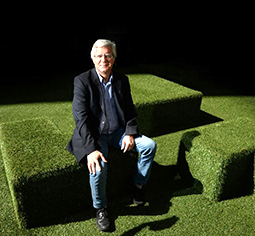Top gong for long life indebted to data
 An Australian computer scientist has become the first to receive a top award in the field.
An Australian computer scientist has become the first to receive a top award in the field.
Professor Timos Sellis has been named a Fellow of the Association for Computing Machinery (ACM), the world's largest educational and scientific computing society.
Sellis currently works with RMIT's School of Computer Science and Information Technology.
Making ACM's Fellow grade is drenched in prestige. The Fellowship recognises the top 1 per cent of ACM members for their outstanding accomplishments in computing and IT, as well as outstanding service to the computing community.
“It is considered to be the highest distinction in Computer Science, apart from the Turing award - the equivalent of a Nobel Prize,” Professor Sellis said.
“It gives me great satisfaction to see that my work has been recognised by my peers.
“Moreover, I feel very happy to have the opportunity to collaborate with excellent PhD students and postdocs, who give me the drive to pursue continuously new research results, and it is to them that I dedicate this award,” he said.
ACM President Vinton G Cerf says Fellows past and future will continue to make almost unbounded contributions.
“We recognise these scientists and engineers, creators and builders, theorists and practitioners who are making a difference in our lives,” he said.
“They're enabling us to listen, learn, calculate, and communicate in ways that underscore the benefits of the digital age; their advances have led to opportunities for improved healthcare, enhanced security, expanded interactions, and enriched lifestyles.”
Professor Sellis specialises in database query optimization, spatial data management, and data warehousing nowadays referred to as “big data”, wholly embracing the new age data management.
“In the past I have worked on various issues related to data management, like how to optimize queries running over vast amounts of data, how to efficiently handle large volumes of spatial and spatiotemporal data, efficient implementations of data warehouses, and other related problems,” he said.
“More recently, I have focused on GeoStreaming data - data coming from GPS equipped devices, called ‘data streams’.
“These 'data streams' pose very interesting problems in many applications such as transport, monitoring, security, sensor networks, as they produce vast amounts of data which have to be handled in real-time.
“My personal research agenda for the next few years includes working on Big Data Infrastructures - techniques, algorithms and systems that are able to handle big data in various areas including scientific data, social network data and government data.”







 Print
Print